I believe the Irish language is one of our greatest national treasures, and an integral part of our ancestral heritage. Much of our appreciation of our culture and traditions is dependent on understanding the significance of the Irish language.
Our music, our way of speaking the English language, our literature and poetry, our theater, our legal system, our pastimes and sports have all been greatly influenced by our language. In fact, I will go so far as to say that many facets of modern Irish society and our very psyche as a people have been infused by the Irish language.
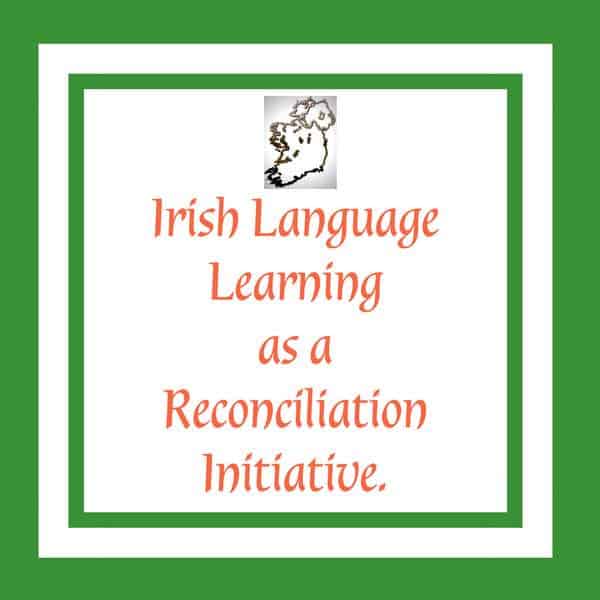
I suppose you could say I'm an enthusiast when it comes to the importance of the Irish language in furthering our understanding of our culture and heritage.
And so, you can imagine how excited I was to learn of recent language research by the Irish School of Ecumenics at Trinity College, Dublin, that underscores the importance of language-learning projects to revise harmful interpretations of history, and to facilitate critical self-reflection and empathy for others.
Today, I'm delighted to publish this guest post from Trinity College Dublin, explaining their investigation of the "Turas" Irish language project in East Belfast that encourages exploration and study of the Irish language as a reconciliation initiative.
Here is a piece written by Trinity College explaining the study....
Language-learning projects can help revise
destructive understandings of history in a polarized society.
A study by Dr. David Mitchell of Trinity College Dublin of the East Belfast ‘Turas’ Irish language project found language classes help groups in conflict find shared heritage.
Language learning has the potential to build empathy between groups in conflict and help revise destructive understandings of history, according to researchers in Trinity College Dublin, who have conducted a study of the 'Turas' Irish-language center in East Belfast.
The academic study of the Turas Irish-language project comes at a time when the Irish language has never been more politically contested in Northern Ireland. Bitter political disagreement over a potential Irish Language Act is a primary cause of Northern Ireland’s political parties’ failure to restore power-sharing government in Belfast.
Based in a traditional working-class, unionist area, the Turas project runs Irish language classes and community workshops on the little-known historical links between Protestants and the Irish language, and the Irish ‘all around us’ in place names, phrases and linguistic structures derived from Irish.
Turas also provides Irish language singing classes, set dancing classes, and large-scale cultural events. Some 8,000 people have taken part in Turas events and it has around 200 enrolled learners. The project is run by East Belfast Mission, an outreach of the Methodist Church, and led by Linda Ervine, sister-in-law of the late loyalist leader David Ervine.
The study, conducted by researchers at the Irish School of Ecumenics, Trinity College Dublin at Belfast, sought to explain why the Turas project is flourishing and to examine the nature of its contribution to peace and reconciliation in the area. Their findings, based on in-depth interviews with leaders and participants and observations of Turas events, have been published in the journal ‘Ethnic and Racial Studies’.
The researchers found that the project’s success could be attributed to an appetite among many members of the Protestant community to discover an aspect of their heritage that had been denied them by Northern Ireland’s polarized society. The relaxed and welcoming ethos of the project and the charismatic and energetic leadership of Linda Ervine, were also major factors in the project’s success.
Since the advent of power-sharing in the wake of the Good Friday Agreement, the question of what official status or protection should be accorded the Irish language has become a bitterly contested aspect of Northern Ireland’s ‘culture war’, explains Dr David Mitchell, Assistant Professor in Conflict Resolution and Reconciliation, Trinity.
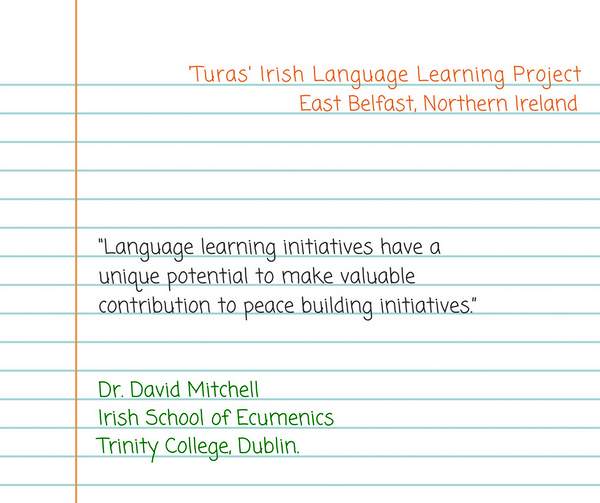
“The Turas initiative is explicitly re-casting Irish as a shared heritage of all the people of Ireland, and indeed Britain and Ireland, given the close links with Scots Gaelic. By challenging the tendency towards cultural polarization this unlikely grassroots peace building project in East Belfast which uses language learning and cultural encounter as its main focus has made a notable contribution to peace and reconciliation. Our study suggests that language learning initiatives have a unique potential to make valuable contribution to peace building initiatives.”
“Unlike other peacebuilding tools such as sport, the arts or inter-church activities, language learning has the advantage of being naturally accompanied by learning of the history of the language. This can open up a space for the discovery of a shared historical experience or the revision of destructive understandings of history.”
The Turas project has wider lessons regarding the capacity of language learning to build peace between groups in conflict, Dr Mitchell continued:
“Language learning also has the potential to develop empathy for the members of another linguistic community. This is not simply because language acquisition creates ‘common ground’ but also because learning a language opens a window into another linguistic community’s inner world revealing nuances of culture and ways of life which would otherwise remain impenetrable. In addition, the close connection of language and place means that language learning may have a unique power to reframe groups’ strong, exclusive identification with particular territories.”
The study did, however, find that some learners were reluctant to reveal the fact that they were learning Irish to friends and family, and many were concerned that the political battle over Irish was working against the progress being made by Turas towards ‘detoxifying’ Irish among unionists.
Reference for this article:
Mitchell, David and Megan Miller (2017) 'Reconciliation through language learning? A case study of the Turas Irish language project in East Belfast'. Ethnic and Racial Studies. https://doi.org/10.1080/01419870.2017.1414278.

Sincere Thanks To Dr. Mitchell and his team:
Many thanks to Trinity College for sharing this study and findings with us today.
I think the name of the project is very apt. 'Turas' pronounced 'thur-us' is the Irish word for journey and this project is truly an amazing journey of shared inheritance and understanding.
Wishing the leaders and participants of the 'Turas' project every success for the future.
Slán agus beannacht!
(Goodbye and blessings)
Irish American Mom
If you enjoyed this post here are some other stories and tributes you might enjoy.


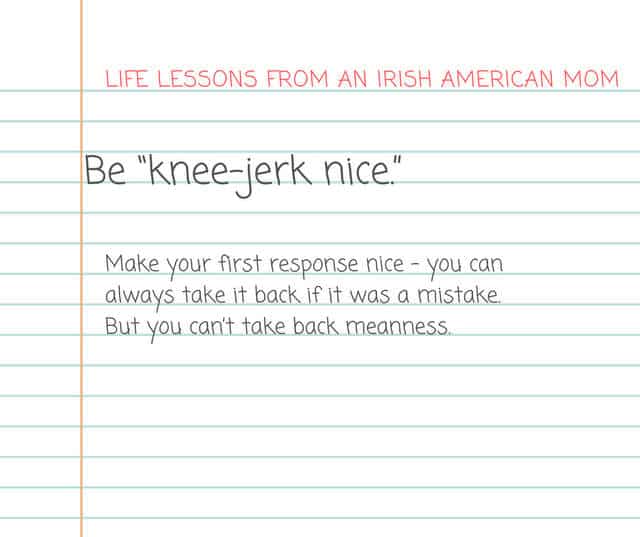
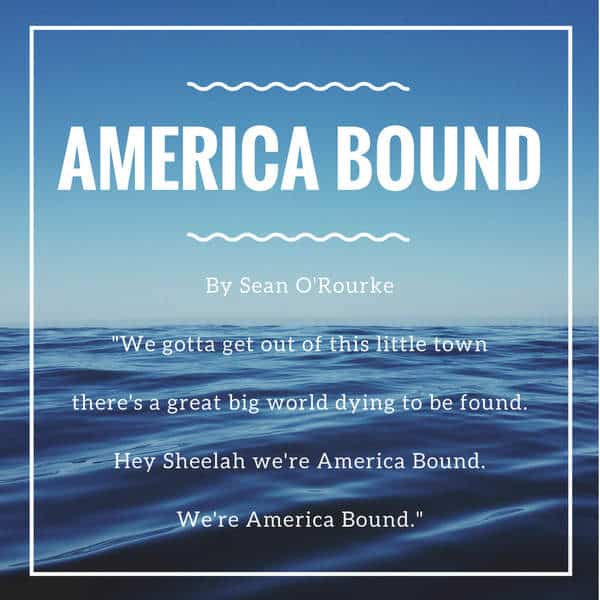
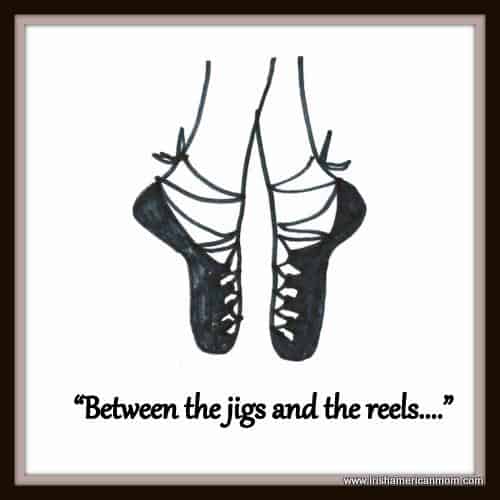
Jeff
Thank you Mairéad for sharing this. It bothers me that someone is identified as something other than Irish. They are id'd along religious or political lines. Hopefully, this can lead to a united Ireland.
Irish American Mom
Hi Jeff - Ireland's history is long and complicated, and many in the Unionist community in Northern Ireland view themselves as British rather than Irish. Programs such as this one promote understanding of our shared culture and are a wonderful way to cross the divides created over centuries. Perhaps a learning program about the history of Unionism would be a wonderful resource for Nationalists. Encouraging empathy and understanding on both sides is the best way forward for all communities. I wish the organizers of this program every success and let's hope it can be used as a basis for many more life-long learning opportunities to come. Thanks so much for checking out this post.
All the best,
Mairéad
Daniel Willam
I totally agree; language and literature can build bridges across cultural, ethnic and class chasms. When I taught English in inner city Philadelphia schools, I always included a minicourse on mythology across the globe. One of the assignments asked the students to make a presentation of a local or family cultural tradition. By the end of two weeks, connections that never existed in the class were made and developed. Hey, guess what? We all belong to the human race. May the Irish language as a reconciliation initiative do well.
Irish American Mom
Hi Daniel - It's lovely to hear your perspective as an English teacher who encouraged exploration of family cultural traditions to find connection between students. What an amazing idea. I love mythology and believe old stories and legends bear lessons valid to this very day. I often am amazed at the similarities between old Cherokee and Irish tales. Many thanks for stopping by and checking out this story about this reconciliation program.
All the best,
Mairéad
irishnannie
This is such wonderful information, Mairead! The words you used, that the Irish language is an "integral part of our ancestral heritage," really seem to approach what I believe is a connection to ancient times when the human race was so much less "divided", or maybe "compartmentalized" is the better word. I truly believe God has chosen Ireland and her sons and daughters to play a very unique role in the Family of Man...and this wonderful effort can't help but begin to trace those things that unify us as human beings as opposed to separate us. Thanks to the sources of of Irish history that we do have, there are so many exciting things to speculate about in terms of relationship...for example, the more obvious and easily known connections involving the Nordic regions and Spain and the different invasions of Ireland...but, in addition how many people realize that there was an entire kingdom composed of northeastern Ireland and southwestern Scotland called Dalriada. Given this was a separate kingdom of its own that involved parts of what we now know to be the separate nations of Ireland and Scotland, this connection can never be entirely erased. Also, correct me if I am mistaken, but didn't the name Scotland come from the name Scoti which once was the name of the inhabitants of the island of Ireland who colonized Scotland? Which brings us back even further to biblical times and possible Hebrew and Egyptian connections...and what about the Phoenicians and their sea lanes that brought them to Irish waters...!
Just think about all these language components that are directly connected to Irish history and very probably have aspects deep within the roots of Irish words we use today! How exciting this is and what a wonderful potential this effort has for finding connections that, as you have presented, could cut through some of the division...God bless this effort!
As always, thank you, Mairead, and God bless you for helping us learn!
Irish American Mom
Hi Irishnannie - The Irish language is a deep and meaningful part of our heritage. I definitely think it is a topic for many more blog posts to come.
Thanks so much for checking out this piece about this amazing project.
All the best,
Mairéad
Siobhan
May I raise a point I think may cause a stir but, as Ireland becomes more multicultural will this not lead to the Irish language being slowly but surely pushed to the background? Irish is now no longer a requirement for the Garda (from Garda site) "(d) Must have a proven proficiency in two languages; one of which must be Irish or English. " thats a big word in there "or". Is this not the start?
Irish American Mom
Hi Siobhan - Thanks for checking out this post. I think the start of the decline of Irish began long ago and will continue for decades amongst the majority of Irish people. However, I think we need to do all we can to preserve it, even if only in small pockets in Ireland. Every little bit counts. I believe this program in Northern Ireland is not so much about teaching proficiency in the language but exploring its cultural significance, and discovering shared inheritance. Perhaps if Irish school children were taught more about the importance of our language and how it influenced our Irish way of life, they would have more interest in learning it. I think it's sad that many Irish school children today view the language as boring and insignificant. Promoting our language is a challenge we have recognized for decades but never truly addressed.
All the best,
Mairéad